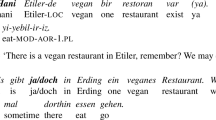Abstract
The paper concerns time, change and contradiction, and is in three parts. The first is an analysis of the problem of the instant of change. It is argued that some changes are such that at the instant of change the system is in both the prior and the posterior state. In particular there are some changes from p being true to ℸp being true where a contradiction is realized. The second part of the paper specifies a formal logic which accommodates this possibility. It is a tense logic based on an underlying paraconsistent prepositional logic, the logic of paradox. (See the author's article of the same name Journal of Philosophical Logic 8 (1979).) Soundness and completeness are established, the latter by the canonical model construction, and extensions of the basic system briefly considered. The final part of the paper discusses Leibniz's principle of continuity: “Whatever holds up to the limit holds at the limit”. It argues that in the context of physical changes this is a very plausible principle. When it is built into the logic of the previous part, it allows a rigorous proof that change entails contradictions. Finally the relation of this to remarks on dialectics by Hegel and Engels is briefly discussed.
Similar content being viewed by others
References
C. B. Boyer, Concepts of the Calculus, Dover Publications, New York, 1949.
N. C. Da Costa and R. A. Wolf, Studies in paraconsistent logic I: the dialectical principle of the unity of opposites, Philosophia 9 (1980), pp. 187–213.
F. Engels, Anti Dühring (1878), English translation, Progress Publishers, Moscow, 1947.
C. Hamblin, Starting and stopping, Monist 54 (1969), pp. 410–425. Reprinted in: E. Freeman and W. Wellars, Philosophy of Time, Open Court, La Salle, 1971.
G. W. F. Hegel, Science of Logic (1812–16), English edition, Allen and Unwin, London, 1929.
L. Humberstone, Interval semantics for tense logics, Journal of Philosophical Logic 8 (1979), pp. 171–196.
J. L. Kelley, General Topology, van Nostrand, Princeton, 1955.
G. W. Leibniz, Letter to Bayle (1687), in: Die Philosophische Schriften von Gottfried Willhelm, Leibniz, ed. C. J. Gerhardt, 1965 Georg Olms. Hildesheim, Vol. 3, p. 52ff. Translated in English in: Leibniz Philosophical Papers and Letters, ed. L. E. Loemaker, Reidel, Dordrecht, 1969, p. 351ff.
D. Prawitz, Natural Deduction, Almqvist and Wiksell, Stockholm, 1965.
G. Priest, Logic of paradox, Journal of Philosophical Logic 8 (1979), pp. 219–241.
—Sense, Entailment and Modus Ponens, Journal of Philosophical Logic 9 (1980), pp. 415–435.
N. Rescher and A. Urquhart, Temporal Logic, Springer Verlag, Vienna, 1971.
R. Routley and R. K. Meyer, Dialectical logic, classical logic, and the consistency of the world, Studies in Soviet Thought 16 (1976), pp. 1–25.
S. K. Thomason, Towards a formalization of dialectical logic (Abstract), Journal of Symbolic Logic 39 (1974), p. 204.
J. F. Thomason, Tasks and super-tasks, Analysis 15 (1954).
Author information
Authors and Affiliations
Rights and permissions
About this article
Cite this article
Priest, G. To be and not to be: Dialectical tense logic. Stud Logica 41, 249–268 (1982). https://doi.org/10.1007/BF00370347
Received:
Issue Date:
DOI: https://doi.org/10.1007/BF00370347



